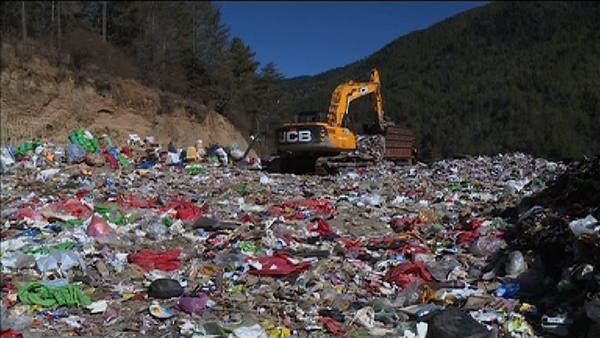 Bhutan made headlines as it banned the sale and use of plastics in 1999. Almost two decades on, the efforts to make the ban effective continue.
Bhutan made headlines as it banned the sale and use of plastics in 1999. Almost two decades on, the efforts to make the ban effective continue.
Pastic wastes account for 12 per cent or almost five tons of the total wastes dumped at Memelakha, the capital city’s only landfill site.
This is despite the fact that not all plastic wastes make it to the landfill site. Half of them land up in drains, and on the roadsides and hike trails.
The weekend vegetable market is one of the places where plastic bags can be seen in abundance. Vegetables come packed in plastics. Vendors also have plastic bags in stock, ready to be handed to the customers.
Both vendors and buyers say lack of alternatives is one of the main reasons why the sale and use of plastic bags remain rampant.
“If we don’t keep plastics, we will lose our customers,” a vendor said. “People used to come with shopping bags, but not many do that now. We have to provide them plastic bags.”
“We have to use plastic bags to maintain our customer base. We don’t have any other option,” Ugyen Dorji, a shopkeeper, said.
“Very few people come with their shopping bags. Paper bags were introduced once but they are expensive.”
The ban on the use of plastics was reintroduced twice in 2005 and 2009. A new waste regulation was also implemented in 2012.
But they did little or no help in getting rid of plastics from the market and people’s homes.
Dasho Paljor J. Dorji is a Special Adviser to the National Environment Commission (NEC). He says there is no public will to make the ban work.
“I don’t think the public are willing to participate. I don’t think we went to the public enough,” Dasho said.
Dasho also put forth an interesting argument. Why ban it, he asks. He thinks it can be handled differently.
“We could still use plastics but use wisely and dispose correctly. As long as there is a proper disposal system, I don’t see any harm in using plastics,” he said in support of his argument.
Thrompon Kinlay Dorjee agrees. “I don’t understand the ban. I personally don’t support it,” he said.
“I can never implement the policy or ban plastics to reduce waste in my town. This is because just by banning plastic bags, it won’t make any difference. All the goods we import come wrapped in plastics,” the Thrompon added.
The CEO of Greener Way, Karma Yonten, shared the same concern. He said banning plastics in not a solution.
“We need to come up with alternatives. I don’t think we can ever ban plastic,” Karma Yonten said.
“You may be able to ban the plastic bags, but plastics are everywhere. From the chocolate wrappers and noodle wrappers, everything is plastic, so just banning the plastic carry bags doesn’t make much sense. If you are serious about banning plastics, you need to ban everything then.”
Greener Way, Bhutan’s first private waste management company and Clean City, another private company, segregate plastic wastes for recycling.
Relevant agencies have also stepped up efforts. But as consumerism creeps into Bhutanese society, the problem is set to grow bigger.
“The fear is that if we keep generating this amount of plastic wastes, we might very soon have to say that the national flower of Bhutan is plastic,” Karma Yonten said.
“It is a big thing to worry about and major policy interventions and solutions have to be explored.”








